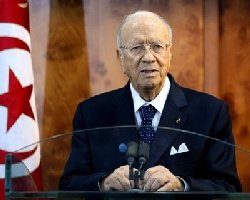Tunisia's interim authorities have disbanded the country's feared state security apparatus, notorious for human rights abuses under the ousted president Zine El Abidine Ben Ali.
Seeking to assert their authority and gain legitimacy in the eyes of protesters who forced Ben Ali to flee in January, the authorities appear to be attacking the remaining vestiges of his 23-year rule, one-by-one.
Meanwhile, Beji Caid Sebsi, Tunisia's new interim prime minister, unveiled a cabinet of technocrats on Monday, rather than career politicians. None of the new ministers had served in previous governments under Ben Ali.
Sebsi told a press conference the ministers had been chosen in the public interest to see through a delicate transition until Tunisians elect a national constituent assembly on July 24.
"This is a temporary government which will be in office for only 4-1/2 months, to save the country from the grave situation it finds itself in," he said.
Shortly after the cabinet line-up was announced, an interior ministry spokesman said Ben Ali's political police and state security apparatus had been dissolved - a core demand behind the popular uprising.
"I can confirm that it was decided to terminate them. We will take other decisions that will please the people," he said.
The twin security organs had functioned as domestic spy agencies with wide powers to suppress opposition to the regime.
Torture accusations
The two agencies' officers monitored opposition politicians and journalists, could arrest people at will, and were accused by rights groups of torturing detainees.
More recently, many demonstrators had said state security agents were infiltrating their protests to stir up violence and trigger a backlash against the uprising.
"It is a dream come true for everyone," Ali Larayedh, a member of the pro-democracy Islamist al-Nahda movement, told Reuters news agency.
"People have suffered because of them. They wrecked politics, the media and the judiciary in this country."
Restrictions on new cabinet
Meanwhile, despite a new cabinet being unveiled, the new prime minister has kept the heads of the crucial defense, interior, justice and foreign-affairs ministries in their posts.
But he named new figures to six posts vacated last week by ministers apparently trying to distance themselves from the caretaker government, seen by some as too close to the regime of Ben Ali.
Monday's announcement is the latest step by interim authorities to restore stability after weeks of protests drove out Ben Ali in January, sparking revolts around the Arab world.
Sebsi, 84, himself was named just a week ago after his predecessor quit amid renewed protest violence.
The prime minister's website said on Monday that the new appointments had been approved by the interim president.
Sebsi had said on Friday that he would present a new cabinet to help pull his country back from the "abyss".
Two previous caretaker administrations collapsed as they included members regarded by demonstrators as being too close to Ben Ali's old guard, such as former interim prime minister Mohamed Ghannouchi.
The members of the new cabinet will not be allowed to be candidates in future elections.
Sebsi said his priorities would be re-establishing security, rebuilding Tunisia's suddenly troubled economy, and bringing life back to normal in the country that has long been a popular tourist destination.
PHOTO CAPTION
Tunisian Prime Minister Beji Caid Essebsi speaks during a press conference in Tunis on March 4, 2011.
Al-Jazeera


 Home
Home Discover Islam
Discover Islam Quran Recitations
Quran Recitations Lectures
Lectures
 Fatwa
Fatwa Articles
Articles Fiqh
Fiqh E-Books
E-Books Boys & Girls
Boys & Girls  Ramadan
Ramadan Fatwa Audios
Fatwa Audios Month of Mercy
Month of Mercy Women
Women Eed Al- Fitr
Eed Al- Fitr Food Recipes
Food Recipes Videos
Videos

 Prayer Times
Prayer Times












